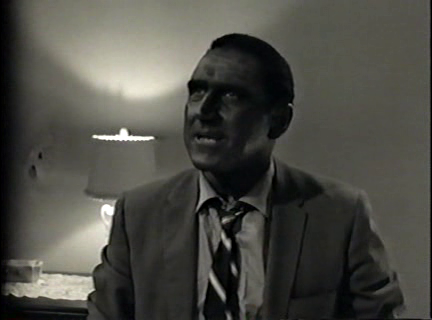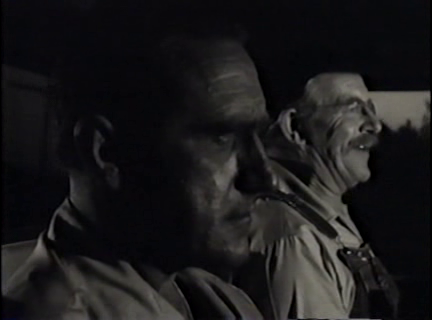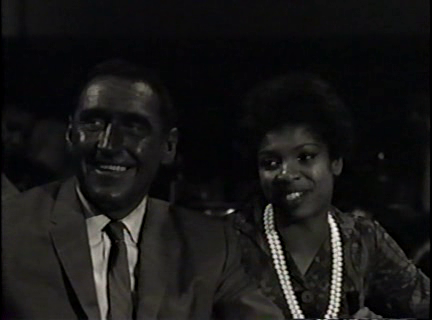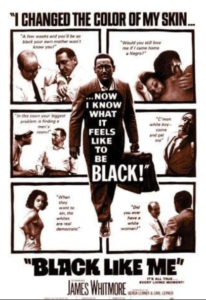|
Genres, Themes, Actors, and Directors:
- African-Americans
- Deep South
- James Whitmore Films
- Journalists
- Mistaken and Hidden Identities
- Race Relations and Racism
Review:
I’ll open my review of this unusual independent film by citing directly from David Sterritt’s article for TCM, where he notes that:
Black Like Me (1964), based on the book of that title by John Howard Griffin, tells the unlikely tale of a bold, flawed, and enduringly controversial experiment carried out by a journalist whose lack of training in social science was balanced by deep curiosity and a profound sense of indignation over some of the ugliest aspects of 20th-century American society.
Indeed, it should be noted that modern viewers will likely have a hard time swallowing the overall intent of this flick — and it doesn’t help matters that (as Bosley Crowther points out in his review) “Whitmore’s make-up does little to convince us he’s actually Black (he looks more “like an end man in a minstrel show”):

… and “Carl Lerner’s direction of the screenplay that he and his wife, Gerda, wrote is melodramatic and unsubtle.” However, also true is Sterritt’s assessment that while this is “not great cinema,” it’s “a compelling time capsule… offering a rough-and-ready sketch of the powerful passions and noble purposes that propelled the civil-rights movement in the crucial year of 1964.”

To that end, in order to contextualize this film within other cinematic efforts of the time, I turn to DVD Savant’s review, where he writes:
As socially conscious filmmaking moved into the 1960s, it became marginalized more than ever. Getting low-budget B&W pictures into theaters was an even tougher sell, and the watered-down liberal messages in TV meant that only a specialized audience went for films about social justice or race equality. The average person thinks that a successful liberal consciousness picture is the overly insistent The Defiant Ones or the feel-good Lilies of the Field or the glamorous Guess Who’s Coming to Dinner? Ironically, those glamorous and unthreatening Sidney Poitier pictures probably did more to convince nervous whitebread America accept the idea that blacks weren’t a scary “other”, than all the heartfelt confrontational movies put together. The nature of film distribution required that movies court a white audience. Sidney won over his audiences by playing characters of obvious virtue and integrity. Good actors like James Edwards and Brock Peters got plenty of bit parts and some that allowed them to express pride in their color, but Hollywood in general reacted to the Civil Rights advances with a dose of defensive tokenism.
With all this important contextualizing information in mind, Black Like Me is recommended for one-time viewing.
Note: I found it especially intriguing reading more about Griffin himself in Sterritt’s overview for TCM, and highly recommend a fascinating 2011 documentary about him available for viewing on Vimeo.
Notable Performances, Qualities, and Moments:
- A most unusual social experiment brought to life on screen

Must See?
Yes, as a powerful (if perhaps inevitably flawed) independent film about racism.
Categories
- Good Show
- Historically Relevant
Links:
|




One thought on “Black Like Me (1964)”
First viewing (6/25/22). A once-must, for its historical value. As posted in ‘Film Junkie’ (fb):
“If we was to hate the white man, then we’d be dragged down to his level – and our race would be ruined for sure.”
‘Black Like Me’ (1964): In one of his recent commentaries for ‘The Last Word’, Lawrence O’Donnell reminded us of the following: In 1991, when she was dating Clarence Thomas, relatives of Virginia (Ginni) Lamp had this to say about Thomas: “I can guarantee you I was surprised when I found out she was going with a black man. It was unusual for us. But he was so nice, we forgot he was black, and he treated her so well, all of his other qualities made up for his being black.”
“It made up for his being black.” That was only 30 years ago, in Nebraska. What a lovely backhanded compliment.
I mention that because, in part, it’s what makes this film still relevant. 30 years was not so long ago. And maybe you can pretty-up racism but it’s still racism. (Of course, now we have a whole 0THER issue with Ginni and Clarence – but who wants to bet that, in his current wave of destruction, Thomas will never turn on interracial marriage. How could he?)
‘BLM’ is set in the late ’50s in the Deep South – where journalist John Howard Griffin (named John Finley Horton here and played by James Whitmore) went undercover (by changing his skin color) to pose as black in order to write about his experiences. (Griffin’s book was published in 1961.)
The low-budget film is somewhat flawed. Whitmore is not completely successful in his visual transformation. And, in his manner as ‘Horton’, Whitmore is at times unbelievably naive in his actions.
But there’s still a lot of power in this story and it remains instructive. ~ especially in scenes like the one in which ‘Horton’ is picked up by a deceptively cheery truck driver (Will Geer) who soon shows a real duplicity. Moving on from asking if ‘Horton’ is married, the trucker asks if his wife has ever “had it” with a white man. He then goes on to inform that he has sex with any black woman who is asking him for employment: “Why, we all do it around here. We figure we’re doin’ your race a favor – with a little white blood in it.”
Apparently (and not surprisingly), Griffin’s book is better than this screen adaptation and more properly detailed. But I still found the film more than just a ‘curio’ and of decided value.